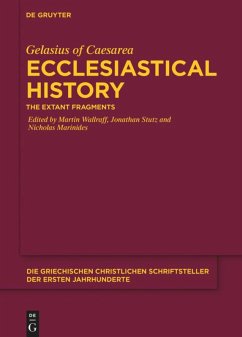Gelasius, the Nicene bishop of Caesarea Maritima for roughly the last third of the fourth century, has been overshadowed by his more famous uncle and patron Cyril of Jerusalem. Gelasius' works are preserved only fragmentarily in later authors.
The most important of his writings was a church history, which supplemented and continued that of his eminent predecessor Eusebius. Later ecclesiastical historians and hagiographers, such as Rufinus of Aquileia, drew on Gelasius' history extensively, although usually without attribution. It furnished them with a model for Nicene historiography and with material on topics such as the youth of the emperor Constantine, the discovery of the True Cross in Jerusalem, the Council of Nicaea, and the beginnings of Christianity in Ethiopia and Georgia. The fragments of Gelasius' Ecclesiastical History are presented here systematically for the fi rst time. They are accompanied by the fragments of his doctrinal writings as well as all known testimonia about the bishop's life and work. The edition is introduced by a thorough discussion of the sources and includes a facing English translation and notes.
The most important of his writings was a church history, which supplemented and continued that of his eminent predecessor Eusebius. Later ecclesiastical historians and hagiographers, such as Rufinus of Aquileia, drew on Gelasius' history extensively, although usually without attribution. It furnished them with a model for Nicene historiography and with material on topics such as the youth of the emperor Constantine, the discovery of the True Cross in Jerusalem, the Council of Nicaea, and the beginnings of Christianity in Ethiopia and Georgia. The fragments of Gelasius' Ecclesiastical History are presented here systematically for the fi rst time. They are accompanied by the fragments of his doctrinal writings as well as all known testimonia about the bishop's life and work. The edition is introduced by a thorough discussion of the sources and includes a facing English translation and notes.
"This new edition will be the first port of call for those interested in this still fairly marginal figure."
Peter van Nuffelen in: Journal of Ecclesiastical History 70/2 (2019), 148-149
"[...] this edition of Gelasius' fragments will prove to be of interminable use by future generations of readers."
D. Antoine Sutton in: The D's Commentary on Books Fall 2018, 7-10
"Die neue Edition wird die Debatte um das kirchengeschichtliche Werk des Gelasios beleben und diese bislang weitgehend ignorierte Schrift in das Blickfeld der Forschung rücken. [...] die Edition [bietet] trotzdem eine aktuelle Einführung sowohl in eine Reihe zentraler Texte für die Kirchengeschichte der Spätantike als auch in einige dem Althistoriker vermutlich nur wenig bekannte byzantinische Texte sowie nützliche Übersetzungen größerer Partien dieser Werke und einen hilfreichen Quellenapparat. In jedem Fall liegt somit ein nützliches Arbeitsinstrument für die Forschung zu Konstantin sowie zur Kirchengeschichte und Kirchengeschichtsschreibung der Spätantike vor."
Raphael Brendel in: H-Soz-Kult, 30.07.2018,
"La edición es pulcra y esmerada, seña de identidad de la editorial."
José M. Floristán in: Erytheia. Revista de Estudios Bizyntinos y Neogregios 39 (2018), 351-354
Peter van Nuffelen in: Journal of Ecclesiastical History 70/2 (2019), 148-149
"[...] this edition of Gelasius' fragments will prove to be of interminable use by future generations of readers."
D. Antoine Sutton in: The D's Commentary on Books Fall 2018, 7-10
"Die neue Edition wird die Debatte um das kirchengeschichtliche Werk des Gelasios beleben und diese bislang weitgehend ignorierte Schrift in das Blickfeld der Forschung rücken. [...] die Edition [bietet] trotzdem eine aktuelle Einführung sowohl in eine Reihe zentraler Texte für die Kirchengeschichte der Spätantike als auch in einige dem Althistoriker vermutlich nur wenig bekannte byzantinische Texte sowie nützliche Übersetzungen größerer Partien dieser Werke und einen hilfreichen Quellenapparat. In jedem Fall liegt somit ein nützliches Arbeitsinstrument für die Forschung zu Konstantin sowie zur Kirchengeschichte und Kirchengeschichtsschreibung der Spätantike vor."
Raphael Brendel in: H-Soz-Kult, 30.07.2018,
"La edición es pulcra y esmerada, seña de identidad de la editorial."
José M. Floristán in: Erytheia. Revista de Estudios Bizyntinos y Neogregios 39 (2018), 351-354

